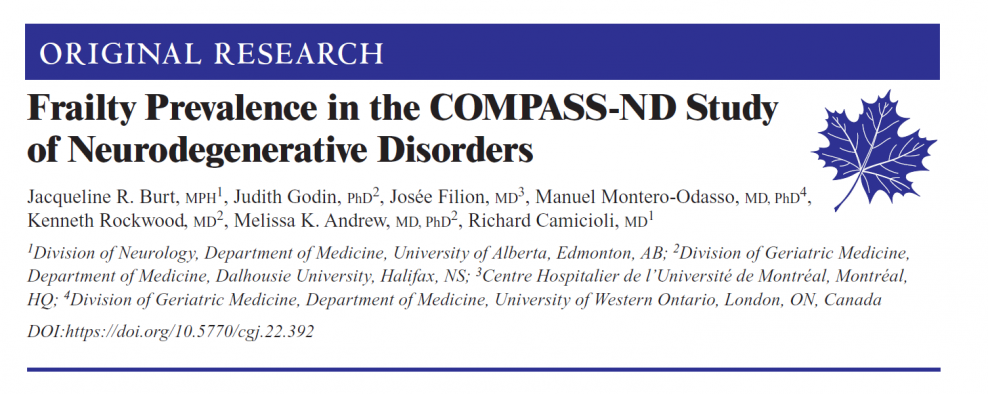The article “Frailty Prevalence in the COMPASS-ND Study of Neurodegenerative Disorders” by J. Burt et al. was published recently in the Canadian Geriatrics Journal. This paper is notable for, among other things, being the first to be generated using the data collected from the Comprehensive Assessment of Neurodegeneration and Dementia (COMPASS-ND) study, the signature cohort study of the Canadian Consortium on Neurodegeneration in Aging (CCNA). A collaboration between Dr. Richard Camicioli’s lab at the University of Alberta and Dr. Melissa Andrew’s lab at Dalhousie University (with contributions by Drs. Josée Filion of the University of Montreal, Manuel Montero-Odasso of Western University, and Kenneth Rockwood of Dalhousie), the article addresses the question of how often frailty, characterized by diminished health and/or strength, co-occurs with neurodegenerative disorders (NDD’s). The authors constructed a measure of frailty independent of NDD symptoms (referred to as the frailty index) and assessed the prevalence of frailty in a broad NDD cohort (the first 150 participants to have their data made available from COMPASS-ND) using their frailty index (FI) and also the validated Frailty Phenotype measure (FP). What they found is that frailty was identified at similar rates by both measures (11% of cohort by the FI and 14% by the FP). While the proportion of participants identified as frail was less than expected, most (84%) of the cohort scored as “pre-frail” according to the FP, corresponding to having 1 or 2 elements of the 5 that make up the Frailty Phenotype (significant weight loss, weakness, exhaustion, slowness, and low activity) and considered a risk factor for future frailty. This finding leads the authors to recommend screening all NDD patients for frailty as part of regular care.
Dr. Howard Chertkow, Scientific Director of CCNA, comments on the significance of this paper: “In addition to providing an important finding, this paper also serves as a demonstration of how CCNA enables collaboration amongst the Canadian dementia research community. Representing different universities and different research areas, these researchers came together to use COMPASS-ND data to address this important topic. I look forward to seeing many more papers published using the COMPASS-ND dataset as its availability and scope grows over the coming months and years.”

